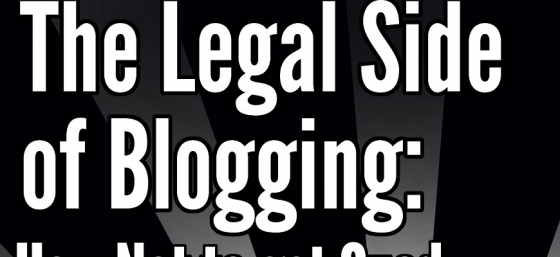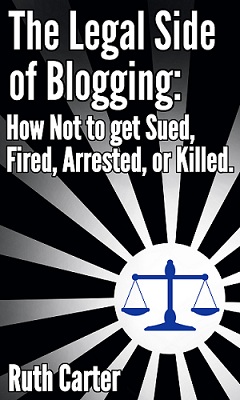 In case you haven’t heard the news, the revision of my ebook The Legal Side of Blogging: How Not to get Sued, Fired, Arrested, or Killed, is out and available in the Kindle Store! (For those of you who don’t have a Kindle, there are free Kindle apps that will let you download and read it on your phone, tablet, and even your desktop computer.)
In case you haven’t heard the news, the revision of my ebook The Legal Side of Blogging: How Not to get Sued, Fired, Arrested, or Killed, is out and available in the Kindle Store! (For those of you who don’t have a Kindle, there are free Kindle apps that will let you download and read it on your phone, tablet, and even your desktop computer.)
I love blogging. I love that every week I get to stand on my digital soapbox and pontificate about anything I want. (Don’t you just love the word “pontificate?”) Early on in my writing career a journalist friend told me that a journalist’s job is to “Comfort the afflicted and afflict the comfortable.” That has become my motto as well. I love that I get to write things that other people are thinking but maybe don’t have the guts to say themselves. I find it validating when people do that for me and I’m happy to pay it forward for others.
 Of course when you’re an outspoken blogger and a law student (now a lawyer), you start asking a lot of questions about what you can say without getting into trouble. That led to me to writing a blog series about the legal side of blogging, taking a class on cyberspace law where I wrote a paper on the topic, and eventually this book. When you have a blog, you have an obligation to know how far you can push the envelope without crossing the line. And then when people get pissed at you because of a post, there’s often nothing they can do about it because you’ve done nothing wrong. The law rarely gives you any type of recourse just because someone made you sad.
Of course when you’re an outspoken blogger and a law student (now a lawyer), you start asking a lot of questions about what you can say without getting into trouble. That led to me to writing a blog series about the legal side of blogging, taking a class on cyberspace law where I wrote a paper on the topic, and eventually this book. When you have a blog, you have an obligation to know how far you can push the envelope without crossing the line. And then when people get pissed at you because of a post, there’s often nothing they can do about it because you’ve done nothing wrong. The law rarely gives you any type of recourse just because someone made you sad.
I wasn’t planning on writing a revision of my ebook so soon, but a conversation with the Copyright Office earlier this year forced my hand. Apparently the word “published” had different meaning to normal rational people and the Copyright Office so I had to revise my chapter on copyright registration and I’m even more convinced that the Copyright Act needs a complete overhaul because it makes no sense when it comes to a lot of material that is only released on the internet.
Since I was doing revisions, I also added a section about anti-SLAPP laws too. SLAPP stands for strategic lawsuit against public participation. This is the type of counterclaim you can file when someone files a lawsuit against you because of your blog in an effort to shut you up. We don’t like it when people sue people just because they don’t like what they have to say but what they’re saying is not illegal.
I hope you enjoy The Legal Side of Blogging: How Not to get Sued, Fired, Arrested, or Killed and recommend it to all your friends who are active on social media. I wrote this book with bloggers in mind but the lessons apply equally well to all types of social media.
You can connect with me on Twitter, Google+, Facebook, YouTube, LinkedIn, or you can email me.
You can also subscribe to the Carter Law Firm newsletter.
Please visit my homepage for more information about Carter Law Firm.
